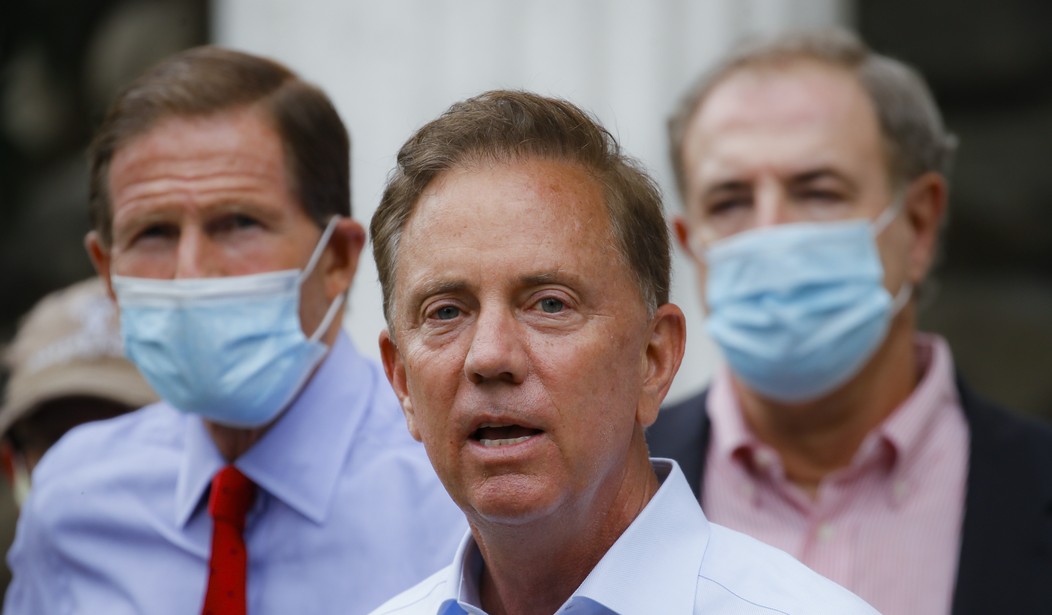He said this yesterday but it’s pertinent this afternoon, with the CDC’s advisory panel having just endorsed boosters for all American adults. I don’t know if that will do much to improve uptake among the public since the previous criteria for boosters were so broad that practically anyone who was motivated to get one could find an excuse to do so.
But there may be political ramifications. Once the CDC signs off on boosters for all adults, there’s nothing preventing third doses from being added to vaccine mandates. Including, potentially, Biden’s federal mandate.
Ned Lamont became the second governor in the U.S., following New Mexico’s Michelle Lujan Grisham, to endorse the idea that full vaccination means more than just two doses. Question: How long before this becomes the mainstream view among Democratic officials up and down the bureaucratic chain?
“We’re 11 months into the vaccination program. In my view, if you were vaccinated more than six months ago, you’re not fully vaccinated,” Lamont said.
“If you were vaccinated more than six months ago, now is the time and go get that booster. I urge you to get it now,” Lamont added.
“Get it before Thanksgiving, before Christmas, before all those holidays, before we see what’s going on in Maine and Vermont and Rhode Island, New York, all around us, and we’ll be ready,” he said.
There’s science on both sides of this debate. If “full vaccination” means maximum protection then Lamont is right, a booster is the only choice. Experts have all sorts of data showing immunity from infection waning over time. If you haven’t had a third dose and you’re more than six months on from the first two, you’re very much a potential vector of transmission. And the more of those there are circulating in the population this winter, the worse the wave is going to be.
But if “full vaccination” means protection from severe illness, people with two doses are doing fine. The vaccines haven’t slipped much in terms of keeping recipients out of the hospital after getting COVID. The point of vaccination was to save lives, wasn’t it? Well, two doses are sufficient for that. For now.
What we’re seeing in this dispute is a reprise of the “community benefit versus individual benefit” argument. Opponents of mandates like Ron DeSantis insist the benefit from the vaccine is individual; the shot keeps you out of the ER but it doesn’t prevent you from infecting others, so why should any business require it among staff? Supporters of mandates counter that there is a community benefit: The shot won’t eliminate the risk of infection but it will reduce it. If we want our states and ultimately the country to have a milder season of COVID this winter, we all need to do our part by getting the shots to limit transmission.
Mandate supporters will be gung ho for boosters and doubtless will eventually try to fold them into mandates, reasoning a la Lamont and Grisham that if we’re going to twist people’s arms we might as well demand maximum efficacy. Fauci was asked about adding a third dose to the definition of “fully vaccinated” earlier this week and wouldn’t rule it out. Lots of people will agree with his reasoning on boosters: “I don’t know of any other vaccine that we only worry about keeping people out of the hospital. I think an important thing is to prevent people from getting symptomatic disease.”
Mandate opponents are destined to end up ambivalent about the need for, and maybe even the utility of, boosters. What choice do they have? The more they concede that boosters are highly effective at restoring immunity to levels where infection and transmission are unlikely, the stronger the “community benefit” case for mandates becomes. DeSantis has gone so far lately as to claim flatly that COVID vaccination isn’t preventing infection, which just ain’t so. It won’t eliminate infection but certainly it’s preventing some transmission within the population. He’s letting the perfect be the enemy of the good because he’s looking for ways to get on the good side of anti-vaxxers:
Gov. DeSantis (R-FL) on opposition to vaccine mandates: “The data is very clear at this point, COVID vaxes are not preventing infection.”
The data is very much not clear about that. pic.twitter.com/5pPWEGK93Z
— The Recount (@therecount) November 18, 2021
If he wants to stay on their good side, he’ll have to take a dim view of boosters. My guess is that he’ll hide behind bromides like “it’s a personal choice” and “it’s unclear how much benefit there is” before sternly vowing that there’ll never be a booster mandate in the free state of Florida.
I also suspect that cohorts that are more likely to be skeptical of vaccines will also be more skeptical of boosters, even among people who are already vaccinated. That is, I’d guess booster uptake will be high among vaccinated white liberals and lower among vaccinated African-Americans and Republicans. If that’s true then we might see an asymmetrical wave this winter in which there’s less transmission in blue states than in red ones, especially red ones with large black populations. Rural areas are also more likely to be “done” with the pandemic in terms of precautions like social distancing and masks, which will also facilitate transmission.
Don’t forget to reserve some blame for the feds if booster rates are low, though. The process they followed in authorizing the shots was needlessly complex, as usual:
The booster data shows benefit *across all ages* for 95% efficacy vs symptomatic infections and for age 40+ vs hospitalizations and deaths. But, remarkably, unlike FDA, the CDC advisory committee still is unable to process these data.
The evidence does not align w/ "MAY" get it. https://t.co/h9UCbj1Qoo— Eric Topol (@EricTopol) November 19, 2021
I don’t get it, based on data from Israel and @Lancet I don’t understand the “should/may” split. That just confuses, everyone over 18 should get the booster, otherwise we won’t get back to normal. https://t.co/w7Lkrq24RO https://t.co/zfAFPhVhPd
— Prof Peter Hotez MD PhD (@PeterHotez) November 19, 2021
Why not just say “your risk of having a bad outcome from COVID rises six months after vaccination, especially if you’re older, so go out and hit the reset button by getting a third dose”? Everything’s more confusing than it needs to be. Par for the course.








Join the conversation as a VIP Member